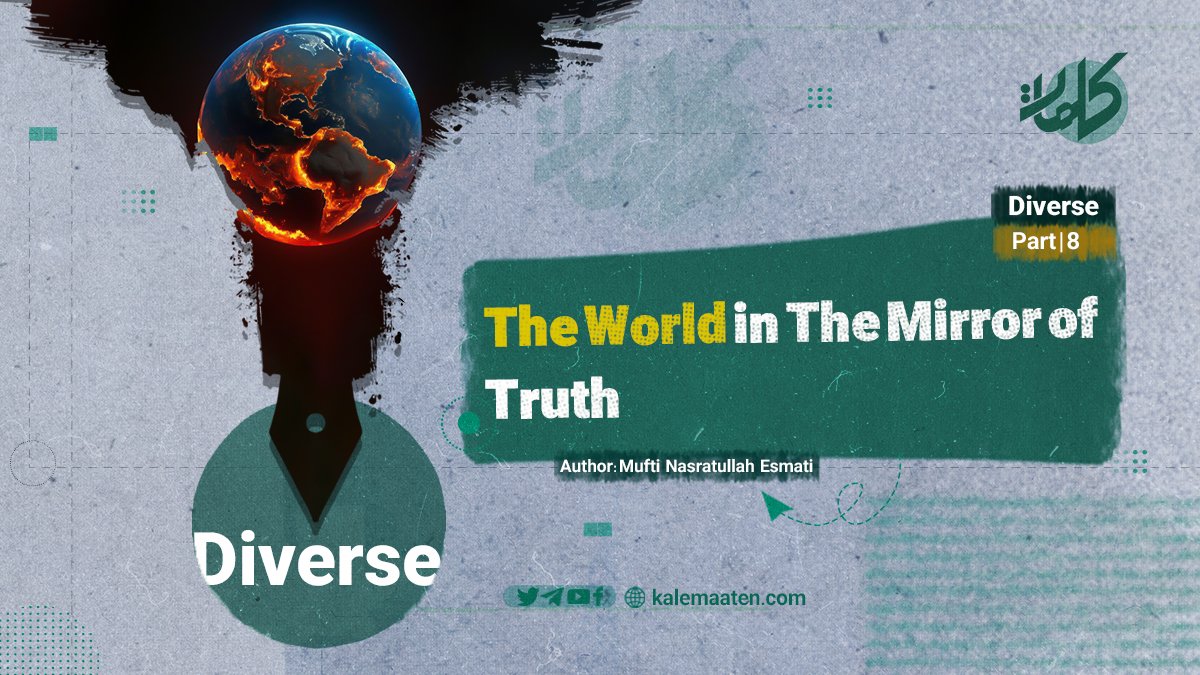
Author: Mufti Nasratullah Esmati
The world in the Mirror of Truth (Part 8)
The World and Its Truths from the Perspective of the Sunnah
-
Be Like a Traveler in the World
عَنْ عَبْدِ اللَّهِ بْنِ عُمَرَ رَضِيَاللَّهُعَنْهُمَا، قَالَ: أَخَذَ رَسُولُ اللَّهِ صَلَّىاللهُعَلَيْهِوَسَلَّمَ بِمَنْكِبِي، فَقَالَ: «كُنْ فِي الدُّنْيَا كَأَنَّكَ غَرِيبٌ أَوْ عَابِرُ سَبِيلٍ» وَكَانَ ابْنُ عُمَرَ، يَقُولُ: «إِذَا أَمْسَيْتَ فَلاَ تَنْتَظِرِ الصَّبَاحَ، وَإِذَا أَصْبَحْتَ فَلاَ تَنْتَظِرِ المَسَاءَ، وَخُذْ مِنْ صِحَّتِكَ لِمَرَضِكَ، وَمِنْ حَيَاتِكَ لِمَوْتِكَ[1]
Translation: Ibn Umar (may Allah be pleased with him) said: The Messenger of Allah (peace and blessings of Allah be upon him) took me by the shoulders and said: “Be in this world as if you were a traveler or a passerby.” Ibn Umar (may Allah be pleased with him) said: “When the night comes, do not wait for the morning, and when the morning comes, do not wait for the night. Take advantage of your health for your illness and your life for your death.”
In explaining this hadith, it has been said that the meaning is not to trust the world and do not consider it as your place of residence. Do not tell yourself that you will stay in it for a long time. Do not attach yourself to the world and be like a traveler who does not become attached to anything in his absence and is always thinking of returning. Such a traveler does not engage in anything that will distract him from remembering his return, so do not be attached to the world either[2].
-
Desire for the world is desire for destruction
وَعَنْ عَمْرِو بْنِ عَوْفٍ قَالَ: قَالَ رَسُولُ اللَّهِ صَلَّىاللهُعَلَيْهِوَسَلَّمَ: «فَوَاللَّهِ لَا الْفَقْرُ أَخْشَى عَلَيْكُمْ وَلَكِنْ أَخْشَى عَلَيْكُمْ أَنْ تُبْسَطَ عَلَيْكُمُ الدُّنْيَا كَمَا بُسِطَتْ عَلَى مَنْ كَانَ قَبْلَكُمْ، فَتَنَافَسُوهَا كَمَا تَنَافَسُوهَا، وَتُهْلِكُكُمْ كَمَا أَهْلَكَتْهُمْ[3]»
Translation: “Amr ibn Aowf (may Allah be pleased with him) said that the Messenger of Allah (peace and blessings of Allah be upon him) said: By Allah, I do not fear poverty for you, but I fear that the world will expand for you as it expanded for those before you. Then you will compete in it as they competed, and the world will destroy you as it destroyed them.
The meaning of this statement is that the expansion of the world and the desire for abundance in it will cause the destruction of a person. Because greed and desire for accumulating wealth make a person heedless of the Hereafter. Also, excessive attachment to the world may cause conflict and disagreement, which will eventually lead to war and bloodshed[1].
-
The Prophet’s fear of the nation’s attachment to the world
وَعَنْ عُقْبَةَ بْنِ عَامِرٍ قَالَ: صَلَّى رَسُولُ اللَّهِ صَلَّىاللهُعَلَيْهِوَسَلَّمَ عَلَى قَتْلَى أُحُدٍ بَعْدَ ثَمَانِي سِنِينَ كَالْمُوَدِّعِ لِلْأَحْيَاءِ وَالْأَمْوَاتِ، ثُمَّ طَلَعَ الْمِنْبَرَ فَقَالَ: «إِنِّي بَيْنَ أَيْدِيكُمْ فَرَطٌ وَأَنَا عَلَيْكُمْ شَهِيدٌ، وَإِنَّ مَوْعِدَكُمُ الْحَوْضُ، وَإِنِّي لَأَنْظُرُ إِلَيْهِ مِنْ مَقَامِي هَذَا، وَإِنِّي قَدْ أُعْطِيتُ مَفَاتِيحَ خَزَائِنِ الْأَرْضِ، وَإِنِّي لَسْتُ أَخْشَى عَلَيْكُمْ أَنْ تُشْرِكُوا بَعْدِي، وَلَكِنِّي أَخْشَى عَلَيْكُمُ الدُّنْيَا أَنْ تَنَافَسُوهَا[2]»
Translation: “Uqbah bin Amir (may Allah bless him) said: The Messenger of Allah (peace and blessings of Allah be upon him) prayed for the martyrs of Uhud after eight years, as one who bids farewell to his living and dead. (That is, due to revelation, it had become clear to the Prophet (peace and blessings of Allah be upon him) that his time of death was near, so he made a will for the living and prayed for the dead, because after death, such an opportunity would not be available again.) Then the Messenger of Allah (peace and blessings of Allah be upon him) went to the pulpit and said: “I will go before you and bear witness for you. Our meeting will be at the Pool of Kauthar, and I can see it from here now. Allah has given me the keys to the treasures of the earth, but I do not fear that you will associate others with Allah after me, rather what I fear for you is that you will compete with each other in acquiring the world.”
In this hadith, the Prophet (peace and blessings of Allah be upon him) expressed his concern about the attachment of the Ummah to the world. His fear was not of poverty, but of competition in acquiring wealth and riches, because this competition makes people forget the Hereafter and causes conflict and destruction. Therefore, the Prophet (peace and blessings of Allah be upon him) warned his Ummah against worldly desires and called them to asceticism and disregard for worldly pleasures.
-
The mortal world and the eternal hereafter
وَعَنْ أَبِي مُوسَى قَالَ: قَالَ رَسُولُ اللَّهِ صَلَّىاللهُعَلَيْهِوَسَلَّمَ: «مَنْ أَحَبَّ دُنْيَاهُ أَضَرَّ بِآخِرَتِهِ وَمَنْ أَحَبَّ آخِرَتَهُ أَضَرَّ بِدُنْيَاهُ فَآثِرُوا مَا يَبْقَى عَلَى مَا يَفْنَى
Translation: “Abu Musa narrates that the Messenger of Allah, peace be upon him, said: Whoever makes this world his beloved and desired, he will suffer damage in the Hereafter, and whoever makes the Hereafter beloved and desired, his world will be damaged. Therefore (given that by choosing one, the other is lost) reason and knowledge dictate that man should prefer the eternal hereafter to the mortal world.”
The meaning of loving and seeking the world is that a person makes the world his main goal and focuses all his attention on it. Such a person loses his hereafter. On the other hand, someone who has the love and desire for the hereafter in his heart refrains from collecting and accumulating worldly things.
However, if a person makes his ultimate goal only the pleasure of Allah and considers worldly pursuits as a means to draw near to Allah and please Him, he is neither considered worldly nor will he be oblivious to the hereafter. Such a person, even at the height of worldly pursuits, remains protected from sin.
Continues…



